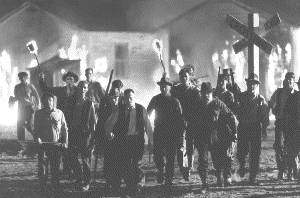The lawn mower went for twenty bucks…
Because of our recent cross-country excursion, my wife and I needed to get rid of every item that had no bearing on our new life (eg, we don’t need a snow shovel in a Los Angeles apartment) or that wasn’t absolutely vital or that didn’t bring us enormous quantities of joy. So a couple of weeks before we left, we held our first moving sale.
The end table went for ten dollars…
It was liberating to dispose of so much junk that had cluttered our lives. And the cash was nice, although when we figured out how many hours we poured into the effort, we figure that we made minimum wage. Perhaps it’s a question for the “Freakonomics” guys: Does anyone actually make decent money having a garage sale?

My neighbor carted off the entertainment center…
In any case, the biggest surprise of the weekend was the makeup of our customers. I had assumed that most of the people who frequented rummage sales were old women eager to interact with strangers or suburban guys looking for good deals on power tools or middle-class people who think it’s fun to haggle. Indeed, many of those types of people showed up.
The Asian tea set went to a pre-adolescent boy who was either shopping for his mother or is gay…
However, among the first people to saunter onto our lawn that warm Saturday morning was a quiet Latino who milled about for a moment before asking how much the microwave oven was. It was clear that his English was fledgling, so I had to call upon my piss-poor Spanish to make the sale. He seemed delighted at the everything-must-go price.
Minutes later, a car pulled up, and several men spilled out. They were clearly trabadorjes, and they spoke excitedly about the power vac and the ladder and the box of bungee cords. To pay for their acres of items, they presented me with a crisp hundred-dollar bill. Obviously, they had just been paid, in cash under the table, and our moving sale was their Home Depot and Target and Tiffany’s. They culminated the transaction by buying one of my guitars, which I assumed would offer them some entertainment in their shared tiny apartment.
My ex-boss took the fake Christmas tree…
Throughout the day, more of my Hispanic brethren showed up. Latinas looking for costume jewelry and little girls enamored with baubles for a quarter and burly men who bought three t-shirts for a dollar – they poured over our discards eagerly. All seemed thrilled with our approach to pricing.
And I don’t know whether I was happy that we could help people who were obviously short on cash, or saddened that whole families of Hispanics had to resort to yard sales to fulfill basic needs.
The pooper scooper went for a buck…
My wife and I didn’t have the sale as a backdoor to charity. But that’s what it felt like at times. And the recipients were people who looked like me, but who were still trying to figure out how to achieve the privileged position of getting rid of all this junk rather than buying it.
The last things to go were a pair of folding chairs that a middle-aged Latino lugged to his car. After that, the sun began to set, and my wife and I carted the rejects inside, where they would sit until we donated them to someone who really needed them.















